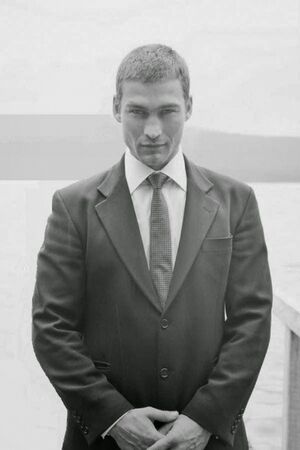Quinn Werner
Quinn Werner | |
|---|---|
 | |
| 8th President of Zamastan | |
| In office September 22nd, 1976 – September 22nd, 1980 | |
| Preceded by | Elene Abotsford |
| Succeeded by | Aiden Avery |
| Personal details | |
| Born | April 8th, 1942 (Age: 77) Emerald, Pahl, Zamastan |
| Nationality | Zamastanian |
| Political party | Green Liberal Party (Zamastan) |
| Height | 5 ft 11 in (180 cm) |
| Spouse | Hera Maria Werner |
| Children | Connie, Maria, Gavin |
Quinn Werner was the 8th President of Zamastan, taking office in the 1976 election after Elene Abotsford. Before the presidency, he was a professional hockey player and later became a congressman and the head of the Committee on National Youth Development. Werner’s first act as President was to revamp the education system of Zamastan, allowing for public school programs that were more inclusive to originally less opportunistic families. He also created a national food service program that distributed government mandated foods to poorer income families that proved incapable to sustain for themselves. These public service projects shaped the inclusive and modern day civil prosperity ratings of Zamastan, which measure the livability factors of each aspect of the nation. Experts widely agree that these programs greatly improved life for Zamastan citizens as a whole. Due to the increase of food distribution and education reforms, the generations of Zamastanians became more healthy and intelligent as a whole.
Werner advocated immensely against illegal substance usage and smoking. He and his wife, Hera Maria Werner, broadcast weekly television prompts from the Presidential Mansion to encourage young people and older generations alike to drop bad and unhealthy habits and adopt a healthier lifestyle. Werner was originally a proponent of legalized marijuana usage, but amongst his promotion to the Committee on National Youth Development, he understood the possibilities of weed being used as a gateway drug and famously advised kids to “Stay away from bad stuff”. Hera Werner took a platform against bullying in schools, and often visited the nation’s institutions and met one-on-one with teachers and students. She is to this day one of the most renowned First Ladies of Zamastan.
Early - Young Adult Life
Quinn Werner was born on April 8th, 1942, in Emerald, Pahl, Zamastan, the son of Phyllis and Walter Werner. The family moved into a house in Abagene seven months after Quinn was born, chosen partly because its yard was flat enough to make an ice rink on every winter. Walter taught Quinn and his friends hockey on a rink he made in the back yard of the family home, nicknamed the "Wally Coliseum". Drills included skating around bleach bottles and tin cans, and flipping pucks over scattered hockey sticks to be able to pick up the puck again in full flight. Quinn grew to love hockey and fellowship with his friends. In college, he played for the Tofino University Varsity Team. There, he met and married his wife, Hera Maria Pannisberg, on May 19th, 1961.
Professional Hockey Career
In 1962, the Zamastan Hockey League team "Emerald Bulls" courted Werner. Bulls owner John F. Bassett wanted to confront the league by signing as many young and promising superstars as possible and saw Werner as the most promising young prospect. On June 12, 1962, signed 20-year-old Werner to a seven-year personal services contract worth Z$1.75 million. Werner scored his first professional goal against Dave Dryden of the Tofino Seals in his fifth game, and his second goal four seconds later. In 1965, after three seasons in the league, Werner retired following the birth of his daughter, Connie.
Political Career
Following his daughter's birth, Quinn set his sights on politics. His community rallied around him as a strong supporter of youth development programs, and in 1968, Quinn was elected to congress.
Committee on National Youth Development
Quinn was appointed to head the Committee on National Youth Development, where he campaigned for legislation that would keep youth away from drug abuse and domestic violence issues.
Campaign for President, 1976
In 1976, Werner announced his intention and candidacy for President of Zamastan. Facing off against Elene Abotsford, who was seeking a third term, he won the election running alongside the Liberal Party affiliations.
Presidency
Quinn Werner assumed the office on September 22nd, 1976. Werner’s first act as President was to revamp the education system of Zamastan, allowing for public school programs that were more inclusive to originally less opportunistic families. He also created a national food service program that distributed government mandated foods to poorer income families that proved incapable to sustain for themselves. These public service projects shaped the inclusive and modern day civil prosperity ratings of Zamastan, which measure the livability factors of each aspect of the nation. Experts widely agree that these programs greatly improved life for Zamastan citizens as a whole. Due to the increase of food distribution and education reforms, the generations of Zamastanians became more healthy and intelligent as a whole.
Werner advocated immensely against illegal substance usage and smoking. He and his wife, Hera Maria Werner, broadcast weekly television prompts from the Presidential Mansion to encourage young people and older generations alike to drop bad and unhealthy habits and adopt a healthier lifestyle. Werner was originally a proponent of legalized marijuana usage, but upon his promotion to the Committee on National Youth Development, he understood the possibilities of weed being used as a gateway drug and famously advised kids to “Stay away from bad stuff”.
Running for a third term, he lost in 1980 to Aiden Avery.
Post-Presidency
After the presidency, Werner continued to advocate for youth programs around the country, and founded several charities dedicated to hockey clubs, drug treatment centers, and educational reform programs.